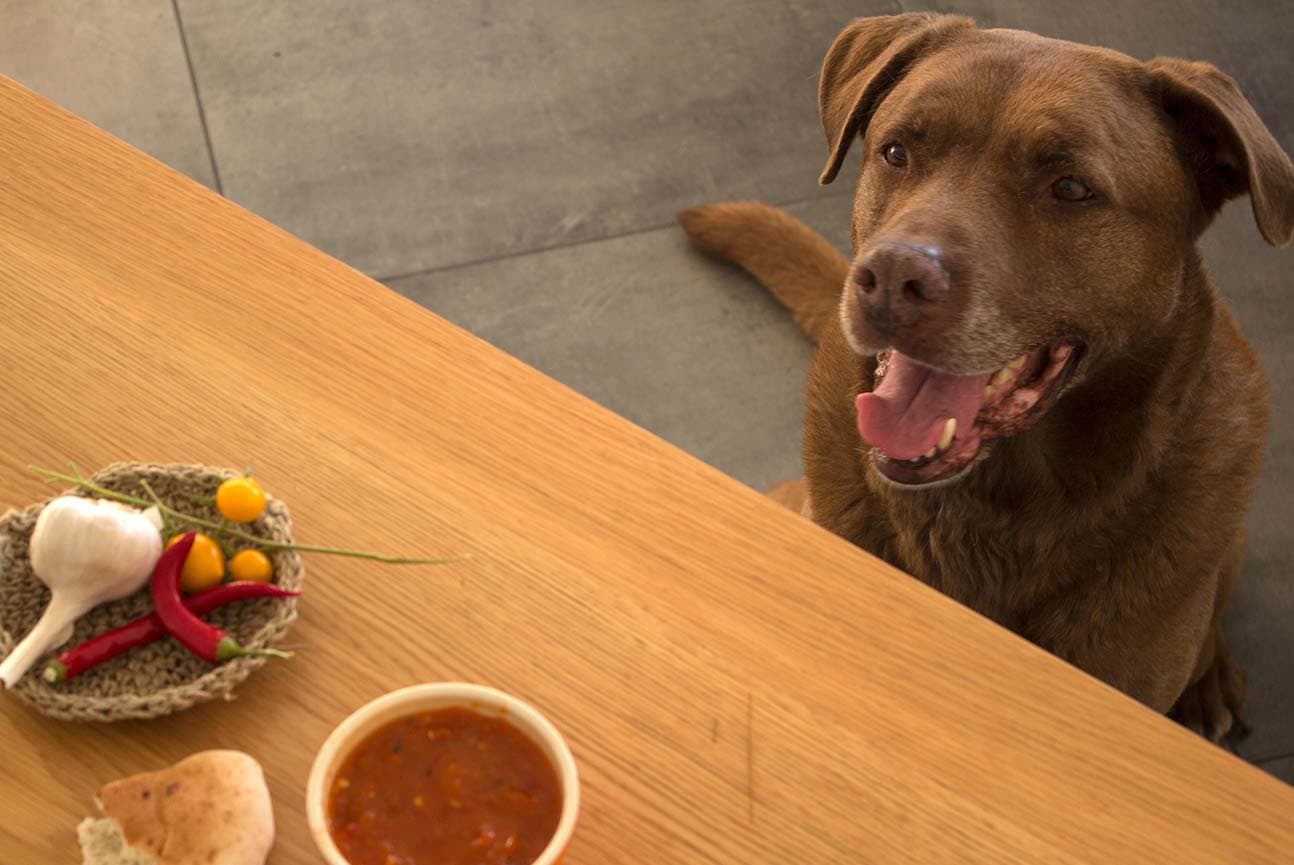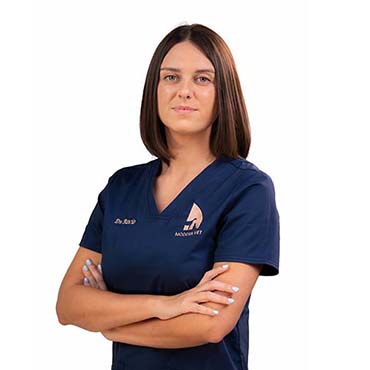Reviewed by Dr. Rocio Mena
Updated on 05/11/2025
Reading time 4 min.
Overview
Severity: Low
Life stage: All
Allium toxicity is one of the more serious forms of food poisoning observed in dogs and, unfortunately, is relatively common here in Dubai, where many beloved dishes are rich in these aromatic ingredients.
The reassuring news is that, with quick intervention and the right knowledge, most dogs make a full recovery from allium poisoning. In this guide, we will walk through the essential information you need to protect your dog in a city where spices and alliums are a staple of everyday cooking.
What Is Allium Toxicity in Dogs?
Allium toxicity occurs when dogs consume plants from the Allium family. These include onions, garlic, leeks, chives, and spring onions. These everyday cooking ingredients contain compounds called disulphides and thiosulphates that are perfectly harmless to humans but are dangerous to your dog’s red blood cells.
These toxins damage red blood cells gradually, which means symptoms might not appear immediately. Your dog could seem perfectly fine for hours or even days before showing signs of illness, making it easy to miss the connection between what they ate and how they’re feeling. In severe cases, allium toxicity can be life-threatening, though most dogs recover well with prompt treatment.
The Allium Family and Why They’re Dangerous
Onions: Whether raw, cooked, powdered, or dried, all forms are dangerous. That includes onion rings, French onion soup, and even baby food containing onion powder.
Garlic: Considered the most potent member of the family, garlic is roughly five times more toxic than onions. This includes fresh garlic, garlic powder, garlic salt, and garlic supplements.
Leeks, chives, and spring onions: Often overlooked but equally dangerous, these are common in many international cuisines popular in Dubai.
Concentrated forms like powders, salts, and dried varieties are particularly dangerous because they pack more toxin into smaller amounts.
How Much Allium Causes Toxicity in Dogs?
Unfortunately, there’s no universally “safe” amount. Toxicity depends on several factors, including your dog’s size, the type and amount of allium consumed, and individual sensitivity.
General guidelines suggest:
- Garlic: As little as 5 grams per kilogram of body weight can lead to changes in the red blood cells
- Onions: Ingestion of around 0.5% of your dog’s body weight can lead to toxicity
It’s important to remember these are only estimates. Some dogs show symptoms after consuming much smaller amounts, whilst others might tolerate slightly more. This is why we always recommend treating any allium consumption as a potential emergency, regardless of the quantity.
Symptoms of Allium Toxicity in Dogs
The tricky thing about allium poisoning is that symptoms often appear 24-48 hours after consumption, sometimes up to a week later for smaller amounts.
Early symptoms include:
- Vomiting and diarrhoea
- Excessive drooling
- Loss of appetite
- Lethargy and weakness
- Abdominal pain (your dog might arch their back or seem uncomfortable)
More serious symptoms develop as red blood cells are damaged:
- Pale or yellowish gums
- Difficulty breathing or rapid breathing
- Dark red or brown urine
- Collapse or extreme weakness
- Increased heart rate
In Dubai’s heat, these symptoms can be particularly concerning as they may be mistaken for heat exhaustion. However, if your dog has been indoors in air conditioning and still shows these signs, allium toxicity should be high on your list of concerns.
Risk Factors: Are Some Dogs More Vulnerable?
Whilst any dog can develop allium toxicity, some are at higher risk:
- Japanese breeds, including Akitas and Shiba Inus, have a genetic predisposition that makes them more vulnerable to allium toxicity.
- Small breeds are at higher risk simply because smaller amounts represent a larger dose relative to their body weight.
- Curious puppies and dogs with a tendency to scavenge are at greater risk of ingesting onions or garlic from the floor or rubbish bins.
Diagnosis: How Vets Identify Allium Toxicity
When you bring your dog to Modern Vet with suspected allium poisoning, diagnosis typically starts with your account of what happened. Always bring any packaging or leftovers if possible. Knowing exactly what and how much your dog ingested helps enormously.
Diagnostic tests may include:
- Blood tests to check red blood cell counts, haemoglobin levels, and organ function
- Urine analysis to look for signs of red blood cell breakdown
- Physical examination to check gum colour, heart rate, and breathing
Follow-up testing is often recommended because damage can continue developing for several days after ingestion, even if the initial results are normal.
Veterinary Treatment for Allium Toxicity
Treatment depends on how quickly you seek help and how much your dog consumes.
If caught within 2-3 hours, your vet may induce vomiting to remove unabsorbed toxins from the stomach. This is most effective with recent consumption and should only be done under veterinary supervision.
Supportive care may include:
- Intravenous fluids to support kidney function and help flush out toxins
- Activated charcoal to prevent further absorption of toxins
- Anti-nausea medication to control vomiting
- Gastroprotectants to soothe the stomach lining
Severe cases with significant anaemia:
- Blood transfusions may be necessary
- Oxygen therapy to help with breathing difficulties
- Hospitalisation for intensive monitoring
Dubai-specific considerations: Climate-controlled facilities ensure your dog stays comfortable during treatment, which is particularly important as stressed or overheated dogs may struggle more with recovery.
Home Care and Monitoring
If your dog has mild symptoms and your vet determines home care is appropriate, careful monitoring is essential.
- Ensure constant access to fresh water: this is particularly important in Dubai’s dry climate, where dehydration compounds problems.
- Feed small, frequent meals of bland food if your dog is eating. Avoid rich or spicy foods that might further upset their stomach.
- Monitor urine colour: dark red, brown, or unusually dark yellow urine requires immediate veterinary attention.
- Keep activity levels low until blood work returns to normal. In Dubai’s heat, this means keeping your dog indoors in air conditioning and avoiding walks during peak temperature hours.
- Watch for worsening symptoms and contact your vet immediately if your dog becomes more lethargic, stops eating entirely, or shows any breathing difficulties.
Prevention: Keeping Your Dog Safe in Dubai
Prevention really is the best medicine when it comes to allium toxicity..
Kitchen safety:
- Clean up cooking spills immediately
- Keep rubbish bins tightly sealed and out of reach
- Never leave plates or bowls accessible after meals, even if they look “clean”
Dubai-specific precautions:
- House help and visitors: Ensure anyone caring for your dog knows they shouldn’t share food, no matter how much your dog begs
- Dubai’s vibrant community loves food-sharing events. Keep your dog on a lead and away from buffet areas
- Some ornamental plants in the allium family are grown in Dubai gardens. If you’re landscaping, avoid planting ornamental onions, garlic chives, or society garlic where your dog has access.
When to Seek Emergency Help
Contact Modern Vet immediately if your dog:
- Has consumed any amount of allium, even if they are not showing symptoms
- Has pale, white, or yellowish gums
- Has dark red, brown, or port-wine coloured urine
- Is collapsed, extremely weak, or having difficulty breathing
- Is having seizures
Worried your dog may have eaten onions, garlic, or related foods? Book an emergency appointment at Modern Vet Hospital in Dubai. Our experienced team can quickly assess for allium toxicity, provide urgent treatment, and deliver ongoing care suited to your pet’s needs. From early diagnosis to emergency support, Modern Vet Hospital is your trusted veterinary clinic in Dubai for comprehensive and compassionate pet care.
Share this, choose your platform!
Reviewed by
Dr. Rocio Mena
DVM
Dr. Rocio Mena was born in Spain and discovered her passion for veterinary medicine early in life. She pursued this dream and graduated from CEU University in Spain in 2018 with a degree in…


